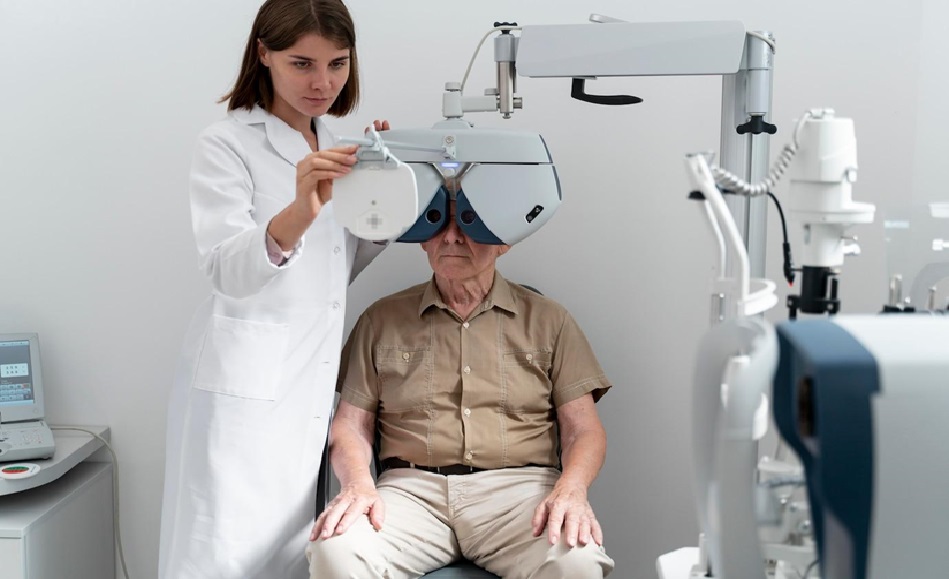Are you a senior experiencing blurry vision? Vision care is vital for maintaining eye health and quality of life. Eye care doctors can address the unique needs of older adults by diagnosing common issues like cataracts and macular degeneration and providing personalized treatments such as prescription glasses or contact lenses. Regular eye exams are crucial for early detection, preventing further vision loss. Eye care professionals can help you see clearly and provide tips for maintaining eye health as you age. Don’t let blurry vision hold you back. Discover how to enhance your vision and enjoy life to the fullest.
The Importance Of Vision Care For Seniors
Vision care is vital for seniors’ health and well-being, as they are more susceptible to eye conditions that can hinder daily activities like reading and driving. Deteriorating vision can lead to isolation and depression, while good vision encourages social engagement and emotional well-being. Prioritizing eye care allows seniors to address issues early, preventing complications and preserving independence. Eye care doctors provide essential evaluations and treatments tailored to the unique needs of older adults.
Common Vision Problems In Seniors
As individuals age, they often experience common vision problems such as cataracts, age-related macular degeneration (AMD), and glaucoma. Cataracts cause the eye’s lens to cloud, leading to blurry vision, but cataract surgery can effectively restore clarity. AMD affects central vision and can hinder activities like reading, with treatment options available to slow its progression. Glaucoma, known as the “silent thief of sight,” damages the optic nerve and can lead to blindness if not detected early. Regular eye exams are crucial for identifying these conditions promptly and ensuring appropriate management.
The Role Of Eye Care Doctors In Senior Vision Care
Eye care doctors, including optometrists and ophthalmologists, are crucial for seniors’ vision health. They diagnose and treat common age-related eye conditions while conducting comprehensive exams to identify issues early. These assessments check visual acuity and overall eye health using advanced tools to detect cataracts, glaucoma, and age-related macular degeneration (AMD). In addition to diagnosing conditions, they educate patients on eye health and offer personalized treatments, such as eyeglasses or surgical options, tailored to each patient’s needs.
Comprehensive Eye Exams For Seniors
Comprehensive eye exams are essential for seniors, offering a thorough assessment of eye health and vision beyond standard checks, especially given the higher risk of age-related eye diseases. These exams include visual acuity assessments, refraction tests for glasses prescriptions, and retinal examinations to detect conditions like glaucoma and age-related macular degeneration (AMD). Seniors should have these exams annually, as early detection allows for more effective treatment and monitoring of vision changes over time.
Treatment Options For Senior Vision Problems
Eye care doctors offer tailored treatment options for seniors based on their diagnosed vision problems. Prescription eyeglasses or contact lenses enhance clarity and comfort for refractive errors like nearsightedness or astigmatism. Cataracts may require surgery to replace the cloudy lens with an artificial one, restoring clear vision. In cases of age-related macular degeneration (AMD), treatment varies: dry AMD may involve lifestyle changes and supplements, while wet AMD often requires anti-VEGF injections. Eye care professionals collaborate with seniors to determine the most effective strategies for their needs.
The Benefits Of Regular Eye Care For Seniors
Regular eye care is vital for seniors, enabling early detection of eye diseases and timely intervention to preserve vision and quality of life. These visits provide insights on nutrition, UV protection, and managing chronic conditions like diabetes, helping seniors make informed health choices. Furthermore, ongoing monitoring allows for adjustments in treatment plans and fosters a trusting relationship between seniors and eye care professionals, enhancing overall well-being.
Tips For Maintaining Good Eye Health As A Senior
Seniors can maintain eye health by eating a diet rich in fruits, vegetables, antioxidants, and omega-3 fatty acids. Wearing sunglasses that block 100% UVA and UVB rays is essential for protection. Regular breaks during focused activities, such as following the 20-20-20 rule, can reduce eye strain. Managing chronic conditions like diabetes and hypertension is also vital, so seniors should work with healthcare providers to monitor these conditions and attend regular eye exams to prevent complications.
Vision Care Resources For Seniors
Many resources assist seniors in managing their vision care needs and tailored information on eye health and shared vision issues. Local community and senior centers frequently provide workshops, screenings, and low-cost or free eye exams. Additionally, telehealth options from Carolina Urgent Care allow seniors with mobility challenges to consult eye care experts from home, ensuring they receive essential care without travel stress.
Choosing The Right Eye Care Doctor For Seniors
Choosing the right eye care doctor is essential for seniors, who should consider the doctor’s experience with age-related vision issues and specialization in treating older adults. Selecting a practice that offers a comprehensive range of services, including routine exams and specialized treatments, ensures all vision needs are met in one place. Additionally, a supportive doctor-patient relationship is vital; seniors should feel comfortable discussing concerns and asking questions. An attentive eye care provider will listen, offer clear explanations, and involve patients in care decisions, enhancing their overall experience and outcomes in vision care.
Conclusion: The Importance Of Prioritizing Vision Care As A Senior
In conclusion, vision care is vital for seniors as age-related vision problems become more common. Regular eye exams and expert guidance from eye care professionals are essential for managing conditions like cataracts and macular degeneration, ultimately improving quality of life. By prioritizing vision care, seniors can maintain independence, engage in social activities, and enjoy the world around them. Don’t let blurry vision hinder your life—prioritize vision care to embrace clear sight and enhance your well-being.




